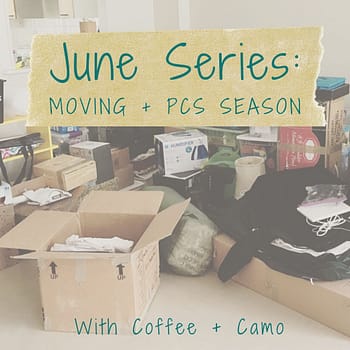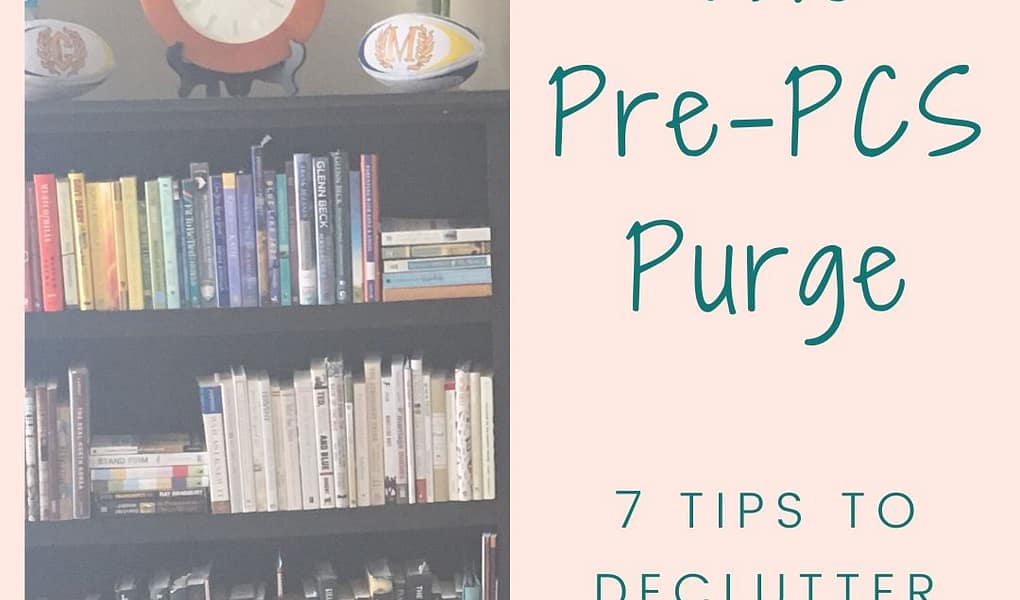 Times of transition are strenuous, but I love them. They are an opportunity to purge, rethink priorities, and be intentional about new habits. We can make our new normal any way we want. – Kristin Armstrong
Times of transition are strenuous, but I love them. They are an opportunity to purge, rethink priorities, and be intentional about new habits. We can make our new normal any way we want. – Kristin Armstrong
My first PCS move left me wondering why we owned so much stuff. Our small shipment of unaccompanied baggage arrived at our new home overseas a month after we did. We lived with those few items for another month before the rest of our stuff arrived, and I was surprised by how easy and freeing it was to live with so little. Less to clean and organize, less to unpack and repack.
What to Purge and What to Keep
The decision of what to purge and what to pack gets harder if your next assignment is overseas. Do some research ahead of time to see what shopping options are available on post. Find a spouse or community Facebook group to ask questions. While we agonized over which of our items should make the trip across the pond, we ultimately decided if it fits in our weight limit, we would take it.
Moving from a 2 bedroom apartment meant we didn’t have much to begin with, but we figured it would be easy enough to sell or give away items we arrived with but didn’t need. Knowing our on post shopping options would be limited, and off-post options coming with a language barrier, we decided to save ourselves the headache. We also chose not to put anything into storage, as we didn’t know when we’d have access to it again. Humid North Carolina summers had me doubting our stuff would be salvageable in 3 or more years.
Some people seem to have the gift of decluttering. Although that didn’t use to be me, adopting the frequent moving that comes with the military lifestyle has made me a convert. Since moving to Japan, and facing the reality that we’ll have to move again eventually, I’ve decluttered our home about every 6 months.
Generally speaking, I look at an item and ask myself two questions:
- Have I used this item in the last 6 months or a year?
- If I tossed it and found I needed it, could I replace it in 20 minutes with $20 or less?
Living in a foreign country, landing on an answer for question #2 can be tricky. Sometimes that means I end up holding onto an item a bit longer, and that’s ok.
It doesn’t take long to accumulate stuff you don’t need, but getting started moving stuff out of your home can be hard. To help, here are 7 tips to purge your home for your next PCS.

Purge when you’re not under pressure
Most families have a general idea of when their next PCS will be, so plan to start early. Not only will this give you lots of time to make (sometimes) hard decisions, it will also help you identify items you’re still using but might not work in your next home. I like to keep a list of furniture and other things I’d be willing to part with if they didn’t fit in our next home.
Make it a habit
I work through items like clothing, toiletries, medicines, and our kitchen pantry a few times a year. To help me with more frequent purging, I keep a bag or box in our bedroom closet. Each time an item doesn’t fit, or I realize I no longer like it, it goes in the bag. Before I donate, I’ll look through and toss out anything that’s stained or torn. Having a place to immediately put items I don’t want to keep helps purging become second nature.
Start small
Get rid of obvious trash first. I then pick a room to work in. Usually, rooms like the guest room and bathrooms take the least amount of time. I start purging things I can tackle in a few minutes – the bathroom cabinets, the spice rack, or one dresser drawer. If I’m feeling good and have time, I’ll continue working, gradually moving up to bigger spaces like closets.
Still have stuff in boxes from your last move? That might be a good, easy place to start – clearly, you haven’t needed that stuff.

Have a plan
There’s nothing worse than decluttering a bunch of things and not knowing what to do with them. Most people sort items into three piles: sell, donate, and trash.
Pick out a place to donate your items in advance. Vet offices and animal shelters can often use old sheets and towels. Local Lion’s Club chapters usually accept used eyeglasses. See if your town as a women’s or homeless shelter that takes donations of clothing or toiletries. (If donating to places that serve lower-income populations, remember that your goal is to help bring dignity and assistance to people. Unexpired, unopened, and gently worn items are best). Find a thrift store that supports local non-profits, veteran’s organizations, or shelters. Need more ideas? Check out this list from Apartment Therapy.
Facebook also has a number of “buy nothing” groups, where people exchange goods and sometimes services in a barter system. If an item is in good condition or new, consider passing it along to a friend or neighbor that might be able to use it.
If you’re hoping to sell, consider listing items on Facebook marketplace, eBay, or buy/sell/trade groups for your city or town. Snap a photo of the item as you’re sorting, and jot down a note or two about it. This will make listing the item online easier.
And, of course, don’t forget to look up your neighborhood’s trash schedule. Many areas won’t pick up bulk trash items outside of a scheduled day. Cities often offer free expired medicine turn-in days or free document shred days. Knowing what services are available in your area will help limit the amount of time you’re holding onto unwanted stuff.
Ask for help
Get the family involved! Invite young children into the conversation, asking them what items they might like to pass along to another child. Decluttering is exhausting, emotional work, so don’t expect too much as one time. Plan for frequent breaks, or spend a few days a month working through parts of the house together.
Family not on board? Bring in a trusted friend. Sometimes I need an impartial third party to tell me “I’ve never seen you wear that,” or “When’s the last time you used that?” Having someone else to help you physically sort your items can help make the process easier.

Be gentle with yourself
Humans have a unique relationship with our things. Often, we subconsciously attach emotional significance to inanimate objects, and if we’ve owned something for a long time, we will often value it as more than it’s really worth. All of this makes it hard to get rid of things.
If you’re having a hard time purging an item, move it from its regular place to a holding spot (for us, that’s the guest room). Pack the item in a box or bag, ready to be donated, out of sight if you happen to walk by. Wait a few weeks. If you find yourself looking for or reaching for the item, the time isn’t right. But if a few weeks pass and you haven’t gone looking for it, you probably don’t have a use for it anymore.
Organize as you go
Finding a place for everything, and putting it in its place, will make your life easier when PCS time rolls around. Purging and decluttering isn’t just about getting rid of items you no longer use. It’s also a time to make sure your house is serving you and your family as best it can. If you spend more time looking for something than using it, your house isn’t serving you well.
I hope these tips have helped lessen the stress of the PCS purge. Like most skills, the habit of moving stuff out of your house that is no longer serving you is a skill built with practice. What have you found helpful during the pre-PCS decluttering phase? As always, please leave a comment below sharing your knowledge!

Military life offers some great opportunities, including the chance to live all over the world. But moving is hard. I’ve created a free resource, all about unaccompanied baggage. Being informed about the moving process will make everything smoother. Click the banner to claim your free eBook!


